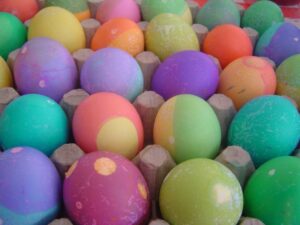Easter is a time of celebration for many families. With it comes the thought of spring, rebirth, Easter egg hunts, and Easter baskets. But what do Easter eggs have to do with the resurrection of Christ?
A Christian holiday
Easter as we know it in the United States has its roots as a Christian holiday. Catholics and Protestants alike celebrate Easter as a time of great rejoicing. They believe that Jesus Christ rose from the dead on Easter morning. It is a fundamental part of their faith. Jesus was crucified on a cross, spent three days in the grave and then resurrected to new life. Many Christians use the term “Resurrection Sunday” because of the pagan connotations that come with the term Easter.
Catholics and some protestant religions celebrate Lent as a time of denying the flesh in preparation for Easter. Good Friday represents the day that Christ was crucified. Easter is always on the first Sunday following the full moon that occurs on or following the spring equinox.
The Easter parade
Legend tells us this may have started by the Emperor Constantine. Supposedly he told his servants, court attendees and subjects to dress in their finest and parade up and down the city in celebration of the resurrection of Christ. This might also indicate where dressing in new clothes on Easter began.
Easter dinner
Many families have big Easter dinners often serving a ham. It is a time of fun, food and fellowship, which has always been a part of any celebration. It is a time we set aside to rejoice in what we have and the newness of spring and the gift of life.
The Easter bunny and egg hunts
It is said that the hare was a symbol of the goddess Eostre. Rabbits and hares, like the eggs, represent fertility. Rabbits often make their nests in fields and this gave rise to the belief, by children, that the rabbits laid eggs in the fields as well. Thus the Easter egg hunt was born.
In today’s culture, the Easter bunny is no longer a symbol of fertility but of candy and spring. Easter baskets are supposed to resemble “nests” for the eggs the Easter bunny will bring.
The Easter egg
Easter eggs are a fundamental part of any Easter tradition. Colorful plastic eggs are placed into Easter baskets and filled with goodies of all kinds. In many countries that art of decorating Easter eggs is a highly skilled, decorative art. But why eggs?
Eggs have stood for new life and fertility throughout the ages. Christians see it as a symbol of the new life brought to them with the resurrection of Christ. During the Middle Ages, decorated eggs were said to have been given as gifts.
The ancient Persians decorated eggs to celebrate their New Year, which occurred during the Spring Equinox. For Jews, Easter coincides with the Passover and eggs dipped in salt water represent new life.





